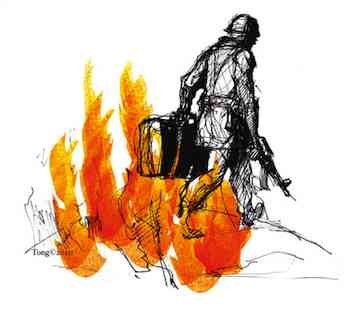- MENU
- HOME
- SEARCH
- WORLD
- MAIN
- AFRICA
- ASIA
- BALKANS
- EUROPE
- LATIN AMERICA
- MIDDLE EAST
- United Kingdom
- United States
- Argentina
- Australia
- Austria
- Benelux
- Brazil
- Canada
- China
- France
- Germany
- Greece
- Hungary
- India
- Indonesia
- Ireland
- Israel
- Italy
- Japan
- Korea
- Mexico
- New Zealand
- Pakistan
- Philippines
- Poland
- Russia
- South Africa
- Spain
- Taiwan
- Turkey
- USA
- BUSINESS
- WEALTH
- STOCKS
- TECH
- HEALTH
- LIFESTYLE
- ENTERTAINMENT
- SPORTS
- RSS
- iHaveNet.com
By Alex Kingsbury

The withdrawal marks an important milestone, but it is too soon to claim victory
Trundling across the southern Iraqi desert in a convoy of swift-moving Stryker armored vehicles, embedded reporters in tow, the last American "combat troops" crossed the border into Kuwait shortly after dawn.
Departing Iraq more than seven years after American forces stormed north across the border to bring down Saddam Hussein's regime, the pullout was a dramatic milestone in the withdrawal of U.S. forces, coming nearly two weeks ahead of the August 31 deadline set by President Obama.
Perhaps wary of another "Mission Accomplished" moment, the
U.S. troop levels in Iraq have dropped by a total of 90,000 since March. On September 1, combat-oriented Operation Iraq Freedom is to be replaced by a "stability" mission called Operation New Dawn.
Yet the end of formal combat operations isn't actually the end of all combat. Some 56,000 troops remain in the country, including logistics and support personnel, trainers, military advisers, and 4,500 Special Forces soldiers. So while the number of American casualties has dropped dramatically in the past year, it is too soon to make final the current U.S. military death toll of 4,415. "The hard truth is we have not seen the end of American sacrifice in Iraq," Obama told the
On the Iraqi side, the death toll has been conservatively estimated at over 100,000, though the true number will likely never been known. Despite relatively peaceful elections five months ago, the national parliament has yet to agree on the makeup of a government. Major issues, including oil-wealth distribution and reconciliation with Saddam-era Baathists, remain unresolved. Meanwhile, neighboring Iran, emboldened by the removal of the threat once posed by Saddam's military, continues to meddle in Iraqi politics and assert its growing regional strength.
Iraq still has 4 million displaced people, a crippled infrastructure, and a violent, if diminished, insurgency that continues a low-grade campaign of bombings that have targeted civilians and Iraqi security forces. A suicide bombing against an Iraqi army recruiting station last week killed 59 and wounded more than 100.
All U.S. soldiers and Marines are slated to lift their boots off Iraqi ground by the end of next year, but many of their tasks will continue to be done by private contractors, diplomats, and intelligence officers. One senior U.S. intelligence official, reflecting on the changing nature of the Iraq mission in an interview Thursday, put it this way: "What the American and Iraqi publics don't realize is that, as the soldiers step back, we're stepping in and staffing up." They'll be based in a hardened fortress in Baghdad that has earned the distinction of being the world's largest and most expensive embassy.
Available at Amazon.com:
At War with the Weather: Managing Large-Scale Risks in a New Era of Catastrophes
© U.S. News & World Report
WORLD |
AFRICA |
ASIA |
EUROPE |
LATIN AMERICA |
MIDDLE EAST |
UNITED STATES |
ECONOMICS |
EDUCATION |
ENVIRONMENT |
FOREIGN POLICY |
POLITICS
World - Iraq: U.S. Combat Troops' Departure Leaves Uncertainty in its Wake | Global Viewpoint